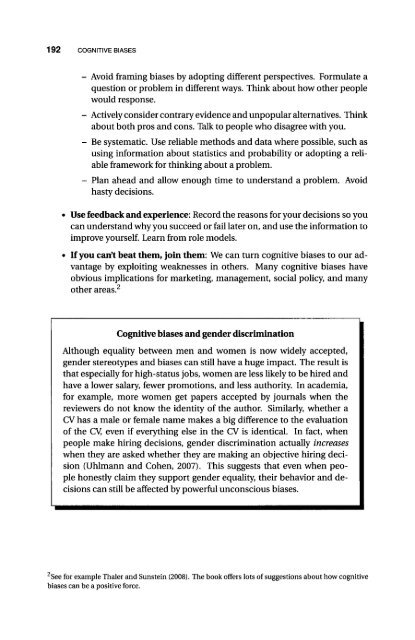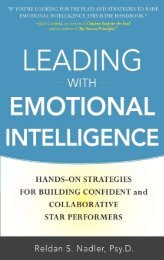An Introduction to Critical Thinking and Creativity - always yours
An Introduction to Critical Thinking and Creativity - always yours
An Introduction to Critical Thinking and Creativity - always yours
Create successful ePaper yourself
Turn your PDF publications into a flip-book with our unique Google optimized e-Paper software.
192 COGNITIVE BIASES<br />
- Avoid framing biases by adopting different perspectives. Formulate a<br />
question or problem in different ways. Think about how other people<br />
would response.<br />
- Actively consider contrary evidence <strong>and</strong> unpopular alternatives. Think<br />
about both pros <strong>and</strong> cons. Talk <strong>to</strong> people who disagree with you.<br />
- Be systematic. Use reliable methods <strong>and</strong> data where possible, such as<br />
using information about statistics <strong>and</strong> probability or adopting a reliable<br />
framework for thinking about a problem.<br />
- Plan ahead <strong>and</strong> allow enough time <strong>to</strong> underst<strong>and</strong> a problem. Avoid<br />
hasty decisions.<br />
• Use feedback <strong>and</strong> experience: Record the reasons for your decisions so you<br />
can underst<strong>and</strong> why you succeed or fail later on, <strong>and</strong> use the information <strong>to</strong><br />
improve <strong>yours</strong>elf. Learn from role models.<br />
• If you can't beat them, join them: We can turn cognitive biases <strong>to</strong> our advantage<br />
by exploiting weaknesses in others. Many cognitive biases have<br />
obvious implications for marketing, management, social policy, <strong>and</strong> many<br />
other areas. 2<br />
Cognitive biases <strong>and</strong> gender discrimination<br />
Although equality between men <strong>and</strong> women is now widely accepted,<br />
gender stereotypes <strong>and</strong> biases can still have a huge impact. The result is<br />
that especially for high-status jobs, women are less likely <strong>to</strong> be hired <strong>and</strong><br />
have a lower salary, fewer promotions, <strong>and</strong> less authority. In academia,<br />
for example, more women get papers accepted by journals when the<br />
reviewers do not know the identity of the author. Similarly, whether a<br />
CV has a male or female name makes a big difference <strong>to</strong> the evaluation<br />
of the CV, even if everything else in the CV is identical. In fact, when<br />
people make hiring decisions, gender discrimination actually increases<br />
when they are asked whether they are making an objective hiring decision<br />
(Uhlmann <strong>and</strong> Cohen, 2007). This suggests that even when people<br />
honestly claim they support gender equality, their behavior <strong>and</strong> decisions<br />
can still be affected by powerful unconscious biases.<br />
2 See for example Thaler <strong>and</strong> Sunstein (2008). The book offers lots of suggestions about how cognitive<br />
biases can be a positive force.
















